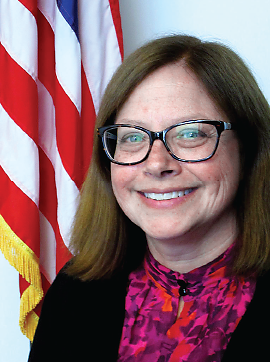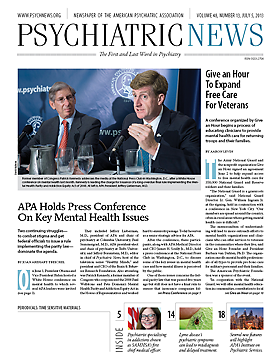Elinore McCance-Katz, M.D., Ph.D., a psychiatrist with a subspecialty in addiction psychiatry, was appointed the first chief medical officer of the federal government’s Substance Abuse and Mental Health Services Administration (SAMHSA) in May.
McCance-Katz is a professor of psychiatry at the University of California, San Francisco (UCSF), and served as the 2009 president of the American Academy of Addiction Psychiatry (AAAP). A long-time member of APA, she led the Physician Clinical Support System (PCSS)-Buprenorphine program, funded by SAMHSA grants, in collaboration with APA’s Council on Addiction Psychiatry. The program has helped train physicians to prescribe buprenorphine for opioid-dependent patients using distance-learning tools.
“We’re very excited to have Elie join us as a chief medical officer to provide the clinical expertise and guidance for all our programs to fulfill our mission of improving behavioral health across the nation,” Paolo Delvecchio, M.S.W., director of SAMHSA’s Center for Mental Health Services, told Psychiatric News.
“My role here is to bring a psychiatric perspective to the many projects at SAMHSA,” McCance-Katz said in an interview. “I will also be leading the HIV and other infectious-disease efforts at SAMHSA.” In addition, she said she will act as a liaison with other federal agencies such as the National Institutes of Health, Centers for Medicare and Medicaid Services, and Health Resources and Services Administration.
“I had already worked with SAMHSA for a number of years on the PCSS project and a medication guideline for persons with posttraumatic stress disorder as well as opioid dependence,” she noted.
Another area of her past involvement, and a continuing priority of the agency, is providing cross-discipline training for medical professionals to improve addiction treatment. “SAMHSA has a very large national training program for screening and brief interventions for alcohol, illicit drug use, and prescription drug misuse. At UCSF, with a grant [from SAMHSA], we did a lot of training in the primary care setting and then expanded it to pediatrics, psychiatry, and other specialties,” McCance-Katz said. She emphasized that psychiatrists, and APA in particular, “have a huge role to play” in integrating the mental health aspects of care with other areas of medicine.
“We don’t have enough psychiatrists. We don’t have enough addiction psychiatrists. Even if you add addiction medicine, the number [of qualified professionals] is small compared with the number of Americans who need these kinds of services,” she noted. “I see APA and affiliated associations playing a role in training their colleagues—not just physicians but also nurses, pharmacists, physician assistants, and even dentists—to identify and help people with mental health or substance abuse issues.”
Indeed, McCance-Katz believes that one of the looming challenges facing SAMHSA and the psychiatry profession is the shortage of qualified mental health care providers to meet the public-health need, a situation that also provides new opportunities for psychiatrists.
“The opportunity is for addiction psychiatrists, as well as general psychiatrists, to become more closely partnered with our colleagues in other aspects of medical care,” she said. “Not only in training, which is key, but we also need addiction psychiatrists and general psychiatrists to be available in hospitals and to provide care in primary care and other settings,” beyond the services traditionally provided by consultation-liaison psychiatrists. Psychiatrists need to become more integrated into the larger medical care system, she suggested.
“Elie is a superb researcher and has taken a national role on various addiction-psychiatry initiatives in the past years. She is a wonderful educator, researcher, and clinician—what we call a triple threat,” Frances Levin, M.D., president of the AAAP, said in an interview. “She’s a visionary and is ahead of the curve on where the field should go, especially on integrating the various types of health care professionals into addiction treatment.”
John Renner, M.D., immediate past chair of APA’s Council on Addiction Psychiatry, emphasized that McCance-Katz “has always been committed to the highest standards of patient care, and we believe that she will make significant contributions to the field in her new position at SAMHSA.” ■

